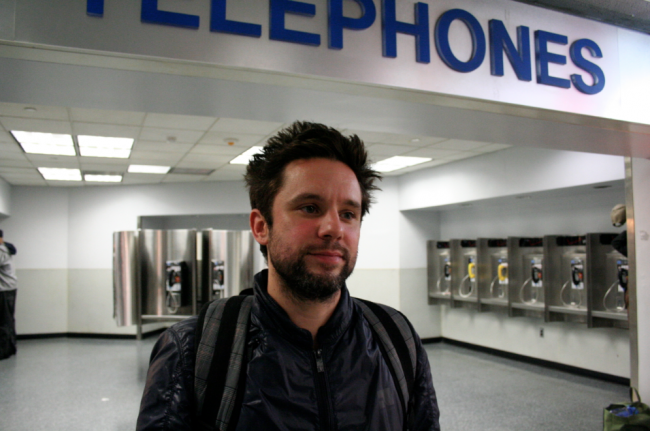Reality Television

The eternal, baffling conceit of all television is that it’s showing you something real, when, more often than not, it’s telling you how to think. This is especially the case now that producers have deranged the very notion of reality into a genre convention all its own. Viewers of the reality genre are expected to double down on the myth of televisual exposure, since reality TV purports to dig deeper into the human drama than mere entertainment fare does.
By staging competitions for scarce resources, as in the breakout network franchise “Survivor,” we’re testing the core postulates about human behavior in the state of nature. By pitting aspiring singers against each other in “American Idol”-and putting them to a public vote-we’re plumbing the wellsprings of the longing for success and recognition, while also (for good measure) shoring up the hoary talent-will-out shibboleths of the national gospel of success. By marching contestants through the Trump boardroom in “The Apprentice,” we’re sizing up the proper quotients of ruthlessness, ego inflation, and sycophancy that form the forever-unstable compound of corporate achievement.
But it’s never the case that reality TV is “real” in any meaningful sense. This isn’t just because producers insist that at least one camera crew is on the scene to record the raw drama of interpersonal confrontation, replete with off-camera lighting and audio set-ups. No, more fundamentally, the sagas of the upward-striving reality format are unreal because they envision perhaps our culture’s purest form of class contempt. Lavishly appointed depictions of overclass leIsure, such as those in Bravo TV’s “Real Housewives” franchise and the gruesome (and now, thankfully, canceled) MTV rite-of-pelf-laden-passage saga “My Super Sweet Sixteen,” provide a study in disaccumulative wealth and entitlement every bit as stark and provoking as the taxpayer-funded executive bonuses at AIG and Goldman Sachs. The surpassingly odd thing about these shows, though, is that they do profess to be natural reflections of our unquestioned social hierarchies; their pecuniary displays are evaluated on the spectrum of taste, not on any moral calculus.
In this respect, and countless others, today’s reality-TV infatuation affords a dramatic contrast with the first great wave of documentary realism in film and photography of the 1930s. Then, an economic cataclysm spurred genuine curiosity among the country’s makers of culture to try to record its impact on the lives of ordinary Americans. Dorothea Lange and Walker Evans harnessed the art of photography-heretofore largely devoted to stylized portraits and nature studies-to document the travails of Appalachian farmers and Okie migrant workers fleeing the Dust Bowl. And those works, in turn, informed extended written studies of the same subjects, such as James Agee’s Let Us Now Praise Famous Men and John Steinbeck’s The Grapes of Wrath. Literary critic Edmund WilSon felt the cataclysm of the Depression had transformed American culture and society so fundamentally that he made it his mission not only to master the literature of Western socialism, but also to report on the plight of the American worker in a series of dispatches for the New Republic, later collected in his anthology The American Jitters. Even Hollywood movies adopted quasidocumentary styles of storytelling in works such as I Was a Fugitive from a Chain Gang. The form became so common that by 1941, Preston Sturges was able to parody it in Sullivan’s Travels, which made the case for escapist comedy as an equally legitimate artistic response to the Great Depression.
Now, no one expects a revival of such straightforward social realism in our own irony-addled age. Indeed, any member of our literary elite diving headlong into our economic crisis with the urgent abandon that seized Wilson in the thirties would trigger a series of pained guffaws. (The one honorable exception in this regard, former cultural studies maven Andrew Ross, is indeed the exception proving the rule. He has become a de facto labor sociologist, and his university cachet and MLA name recognition have plummeted accordingly.)
But it is bracing to consider, by contrast, how today’s less-fortunate Americans fare in the pseudodocumentary genre of reality television. A slew of down-market reality series-from the VH1 reality-show castoff Guignol titled “I Love Money” to the TLC chronicle of the child beauty pageant scene “Toddlers and Tiaras”-remind us of the grotesque consequences that ensue when the wrong sort of ambitions take root in our working classes. Week after week, these lost souls are shown craving a kind of celebrity that is simply beyond their station. And then, in a display that’s far worse, their personal weaknesses are forensically exhibited so as to showcase all the tawdriest symptoms of class exclusion-substance abuse, promiscuity, career failure, the transformation of one’s children into trophy-objects-under the Klieg lights.
These spectacles treat their cast members as twenty-first-century equivalents of sideshow geeks-the carnival performers who would bite the heads off chickens for nothing more than public attention. The pitiable ambitions and individual failings of these down-market souls are treated with such morbid interest because they are the clearest rationales for quarantining them from the ur-American pursuit of the main chance. As the conventions of the reality genre have it, they are asking for the treatment they get-and their casual ostracism by an indifferent mass audience is precisely what they have coming to them.
Even franchises that purport to deliver a class-based comeuppance to the arrogant rich, such as “Undercover Boss,” wind up deferring to the undeviating hierarchies of the success gospel. At the close of each episode of that show, the corporate CEO who has labored incognito in the lowest ranks of his company indulges a sentimental display of noblesse oblige, such as a promotion or a paid vacation-and in one case, a $5,000 down payment on a mortgage for an employee at a Roto-Rooter call center. The New York Times’ television critic denounced this end-of-episode executive flourish as “embarrassingly feudal.”
But that’s not the half of it. Back here in working-class reality, the executives who seem chastened by the hard-knocks curriculum of “Undercover Boss” continue to preside over deeply unequal workplaces, where an individual sentimental gesture from the executive suite rarely occurs-and would count for precious little even if it did. At the same time Roto-Rooter’s CEO was learning the elementary lessons of service-economy kindness, his firm was settling a $2 million class action suit brought by California plumbers for unpaid overtime and working without meal breaks. Another firm featured on the show, 1–800 Flowers, is in the midst of a sex-discrimination suit brought by a former in-house female attorney, which alleges that senior manage- ment routinely referred to women as “babes,” joked about her prowess in fetching them coffee, and kept up a steady stream of offensive, sexually themed comments directed at her.
These beleaguered workers don’t need to see their bosses undergo a heavy-handed, manipulated-for-the-cameras sentimental education every Sunday night. They need unions to safeguard their rights in their workplace and secure them fair wages and humane working conditions. They need legislation to protect their ability to organize in the workplace after a generation’s worth of Reaganite strikebreaking and legal obstruction that has helped drive unionization in the American workforce to a historic low of 7 percent. They need federal and state regulators to stanch the epidemic of “wage theft” that now redistributes an estimated 15 percent of their incomes upward into the coffers of management.
But there’s no titillation to be had in pondering such grim economic developments. So on the pseudodocumentary machinery grinds-with the occasional lurid intrusion from the actual real world to remind viewers that this isn’t all quite the harmless fun and games we’re all encouraged to think it is. In 2009, for example, VH1’s gruesome bottom-feeding defilement of human intimacy, “Megan Wants a Millionaire,” was abruptly canceled when one of its contestants, an investment banker named Ryan Jenkins, was accused of murdering his real-life girlfriend, a swimsuit model named Jasmine Fiore, who was found crammed into a suitcase discarded in a trash bin in Buena Vista, California. Jenkins later committed suicide while on the lam from authorities in Canada. (The network also pulled the plug on the third season of “I Love Money,” in which Jenkins competed and purportedly emerged victorious prior to his stint on “Megan”-though that horrific show was trundled back out for Season 4. Reality producers are only prepared to cultivate the illusion of decency up to a point, after all.)
It’s striking just how little a stir an incident like this makes in the inert and jaded universe of reality television. With Jenkins dead, we’ll never know how much the full-surveillance degradation of his character contributed to his morally squalid end. But it should give all participants in the reality-entertainment world long and painful pause to consider that, in purporting to tease out the “true” nature of a living person weaned on fables of easy money and unearned overnight celebrity, they helped disfigure that nature into something resembling a monster.
No such introspection is on offer, though, among the fearless purveyors of this allegedly vital and enormously popular genre. In a remarkable self-congratulatory 2007 essay in the Atlantic, VH1 executive vice-president Michael Hirschorn made the straight-faced argument that reality television is “the liveliest genre on the set right now. It engages hot-button cultural issue-class, sex, race- that respectable television… rarely touches. And it has addressed a visceral need for a different kind of television at a time when the Web has made more traditionally produced video seem as stagy as Molière.” Hirschorn went on to argue that the flat conventions of the genre made for greater emotional exposure and produced in the process a sort of pluperfect documentary style: “Where documentaries must construct their narratives from found matter, reality TV can place real people in artificial surroundings designed for maximum emotional impact.” He also assures us, as any give-the-people-what-they-want mass-culture burgher must, that “the resistance to reality TV usually comes down to snobbery.” (My, that is a bitingly original approach to the hot-button issue of class.)
It seems reasonable to surmise that Ryan Jenkins did in fact experience some sort of “maximum emotional impact” during his tour through the searing class-, sex-, and race-baiting rounds of reality filming for Hirschorn’s network. But such questions aren’t fit to raise for very long in the otherwise insatiably inquisitorial sanctums of reality programming. And in any event Hirschorn can claim some notional deniability in the Jenkins affair; he left his VH1 perch to run an independent production called ish Entertainment. [Hirschorn had left VH1 in 2008, 18 months before the Jenkins affair, and he did not develop “Megan Wants To Be A Millionaire” or “I Love Money.”] (One of his projects, it pains me to say, is a contract with Bravo to produce “The Approval Matrix,” a show based on a feature I was forced to prototype during my tenure at New York magazine. I can only pray that he forgoes using the introductory text that I slapped on the first layout of the thing in 2004, and which has unaccountably remained there ever since. And while I’m issuing disclaimers, I should also note that my wife briefly worked for Hirschorn at his mercifully short-lived online media tip sheet, Inside.com. He tried to dissuade her from quitting with the promise that they’d soon launch an IPO and she could quit rich if she stuck out the soul-deadening gig a few more months-a claim that proved wildly off-base in the foundering tech economy of 1999, but did continue pointing up Hirschorn’s feel for the hot-button class issue.)
By the time Hirschorn bailed out of his VH1 suite, he was reportedly pulling down more than $1 million a year. I’m sure that helped furnish enough seed money to attract other investors-just as I’m sure that, oh, a quarter of that would likely have helped palliate in some small way the awful suffering of Fiore’s single mother, a ceramic artist. But I guess that’s the sort of far-fetched storybook ending you’d find in a sentimental O. Henry story-or a Molière play, for that matter, not the sort of visceral narrative now demanded by a Web-savvy audience. I Love Money, indeed.
Chris Lehmann’s Rich People Things is shipping shortly, at a great price in book or ebook format!
Yay! We're Going to Stop Spending Money on Defense and Give it to the Schools!

That is what’s going to happen, right, when we don’t pass the defense reauthorization bill, because of the Don’t Ask Don’t Tell repeal rider on it, yes? Susan Collins, Republican of Maine, “who backs repeal of the policy, said she would nonetheless vote against moving forward with debate because of a dispute with the Senate majority leader, Harry Reid of Nevada, over whether Republicans would be allowed to offer amendments to the bill.” So, you know, LOL, good to know, they are not going to take these gays and (legal, and not government-funded!) abortions and having the Mexicans in our Army, so there are not 60 Senators who are going to pass the military spending bill. Some people are still afraid of that little gnome John McCain, who’s all insanely atwitch about gays in his military. Also, maybe Mexicans actually aren’t the new Irish. I guess they can only be the new Irish if they invade Canada, not Iraq.
Sarah Palin Really Likes Flags
Tea Party: The Movie, Starring Sarah Palin has only been out for half an hour, but the reviews are in, and it’s a hit! “Love it Sarah. I am a staunch supporter of yours because of your FEARLESSNESS. I can’t help but feel deep down inside that your calling at this time is to continue doing exactly what you are doing. Rallying the troops. Noone does it better than you. We The People Need you right where you are.”
Thinking Of Nothing Is Hard
Researchers have discovered why it’s so hard to stop thinking about something: “’to stop a thought, the brain uses inhibitory neurons to prevent excitatory neurons from passing information from one to another.’ In effect, halting a thought is akin to ‘stopping a truck on a downhill slope.’ As any space cadet could tell you, it takes ample energy to clear your head as well as fill it.” Or, you know, alcohol!
Random New Yorker: Anthony Mastanduno, Reality TV Director
by Andrew Piccone

Tell me about your job.
I am a producer/director of reality television. I’m a freelancer so I have clients that are production companies, and I can kinda hop from job to job depending on my schedule and what I’m working on. I’m called in to produce and direct, I talk with the families, talk with the participants, get them comfortable, fill them in on what to sort of expect, the process of making a television show, and get them comfortable in a way so that they’re sort of providing material for the show that doesn’t come across as fake, so that they’re themselves. One of things people always say is ‘Well it’s fake, it’s not real.’ I would respond to that attitude by saying ‘if this is fake, then tell me what’s real!’ If you can tell me what’s real, than you can tell me that what we’re doing is fake. My job has a lot to do with getting the participants comfortable, it’s sort of like a brokerage, everything that we do has a process, and if we sort of give them parameters-’here, interact with this person knowing that you each feel a certain way about this, see what happens’-and it sort of evolves from there.
How did you get into this field?
After I graduated from Rutgers with a degree in English and Anthropology, I bought a camera and moved to Albuquerque and started making short films. Then I moved to Philadelphia and started shooting people doing performance art type stuff, and then I was dating a girl that worked on a reality show as the prop coordinator, interviewed to be an associate producer, and got the job. That show was “Design Invasion,” where designers would pair with individuals to give their friend a room makeover in their house, because they had awful design taste.
What’s your favorite thing about your job?
Um, the people. The people that you come across and the situations that you end up being a part of. You find yourself in such unique and different situations. I would never be on a drag racing track in my life, for example, until I find myself on a show working with a family of drag racers, and having the opportunity to just get in a drag racing car and race around the track. It’s crazy stuff like that, and definitely the people. All walks of life, definitely. Part of my role is that I’m able to kind of become the person that they need me to be. You’re no longer this person from New York, you go in and you’re on their turf and you’re working with them and you become their friend. You have to make them feel, every step of the way, comfortable, and ok with what’s going on. Reality television is like an amoeba. You come in and you have to give structure to these situations, you have to make sense of it.
What do you hate about your job?
The fucking hours. Typically 12 to 14 hours a day. The shitty food too. I hate when people don’t belong in the industry. Because it’s not an office, you’re out in the field, you’re with a group of people trying to make this show, everyone has a title, but you’re pretty much on the same playing field. But some people try and turn it into a power thing, a lot of people kind of fail upward, aren’t really good at what they’re doing. I’ve got a good horror story about a show I did once: In Indiana with a truck-pulling family, and we’re all from New York, and it was sort of like we were dropped behind cultural enemy lines. The family we were with were pretty intimidating. This guy was very tough and I think he felt he was getting a bum deal, he wasn’t really cooperating. He proceeded to rip off the mic and wanted to talk to me in private, he brought me into his work shed, turned on all the machines so no one could hear him outside, picked up a metal pipe and started yelling at me to tell him what the fuck was going on. I backed up and left the room, and later I was successful in connecting with him about cars and shit and he calmed down, but later that night I drove back to the hotel and I fucking cried. It’s very surreal when you’re in a place where there are no cell phones, and you’re really in the middle of nowhere.
What’s your favorite place to hang out in New York?
Friday night you can find me hanging out at Timboo’s in Park Slope. It’s a dive bar, but more specifically like a very old neighborhood bar, where the first time I went in I was asked if I was a part of the gentrification of the neighborhood and if I was there because it was funny or if I was there to drink. I said I was there to drink, and well, yeah, that’s a good place to go drink.
What do you think about Republican candidate for governor Carl Paladino and the ever-growing popularity of the Tea Party?
I don’t really follow politics.
What’s your least favorite thing about New York?
It’s filthy.
Previously: Matthew Sterling, Costume Character
Andrew Piccone is a photographer in New York City.
Parrot Nabbed In Pot Bust
Yeah, why not? Here’s the story of Lorenzo, the Colombian parrot “arrested” as a lookout for drug dealers. That parrot really trills those “r”s.
Awkwardsies! Everyone Tiptoeing Up to Armenia to Wish them Well

Aww, the President made a wee little statement for the observation of Armenia’s day of independence. It was very tepid! I’m sure he feels bad about not being able-literally, being prevented from-further enraging Turkey. Still though, in good news, even the president of Turkey sent good wishes to Armenia. One hopes everyone will continue to ignore the little slights.
Men Suffering From Shoe Blindness
More Science! Researchers at Northumbria University have discovered that men don’t really care about shoes and “cannot even tell if a woman is wearing high heels when they walk.” Seriously, ladies, dudes barely notice our own shoes. If it’s man-attention you’re after you are much better off splashing out on something that makes your tits look bigger. Shoes are far too complex and subtle for us.
Giant Solar Flare Will Mess Up Your Access To Internet, Food

Today in WE’RE ALL GONNA DIE!
A GIANT explosion of energy from the Sun could paralyse Earth…, scientists warned yesterday. They fear a huge solar flare is due to erupt… causing blackouts and global chaos. The once-in-a-century disaster could see power grids crash, communication systems collapse, planes grounded, food supplies hit and the internet shut down. Everything from home freezers to car sat navs would be affected.
That, however, is the bad news. The good news is that scientists don’t expect this to happen until 2013, which means we can spend the next few years doing stupid but fun stuff like poisoning our bodies with drugs and alcohol, enjoying the Courtney Cox sitcom “Cougar Town” unironincally and electing Sarah Palin president secure in the knowledge that none of it is going to make a difference once the GIANT SOLAR FLARE comes to take us all home. I feel better already! (Do click through, there’s an exciting artist’s conception of what New York will look like “smothered in a blood-red aurora.”)
